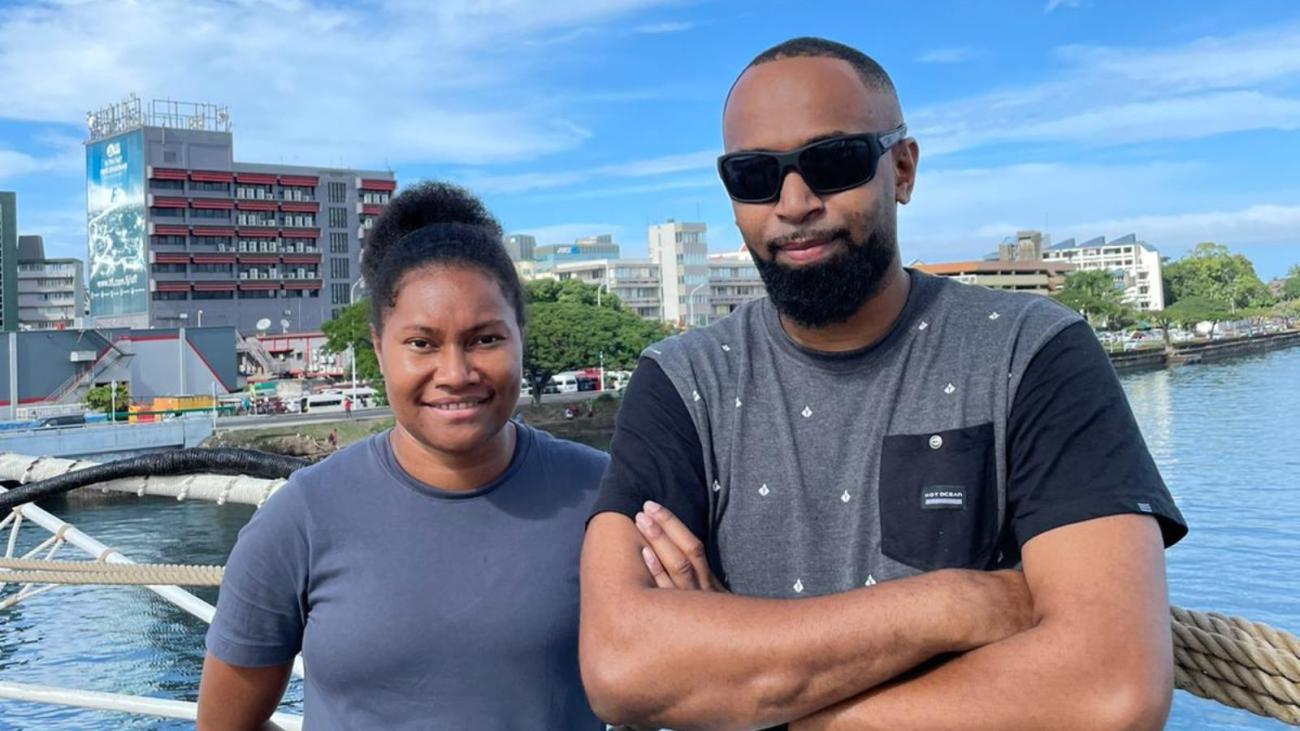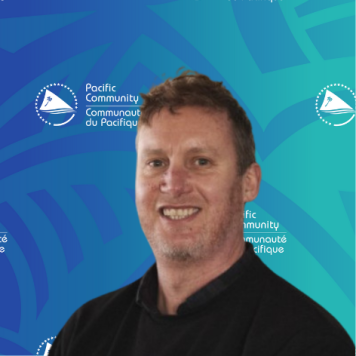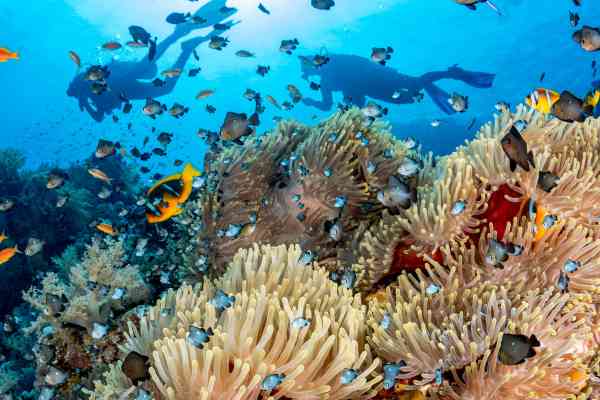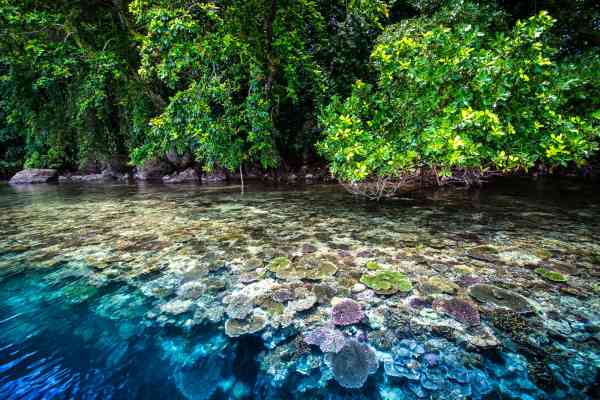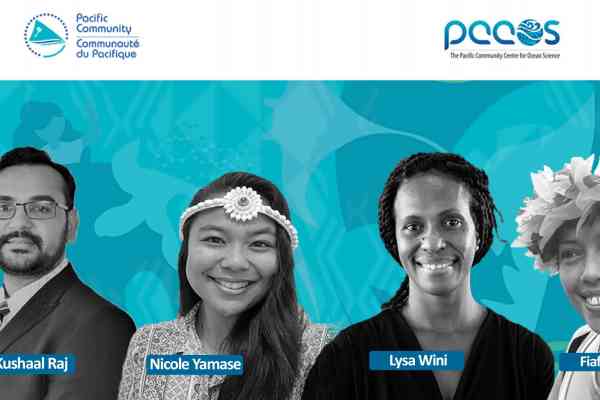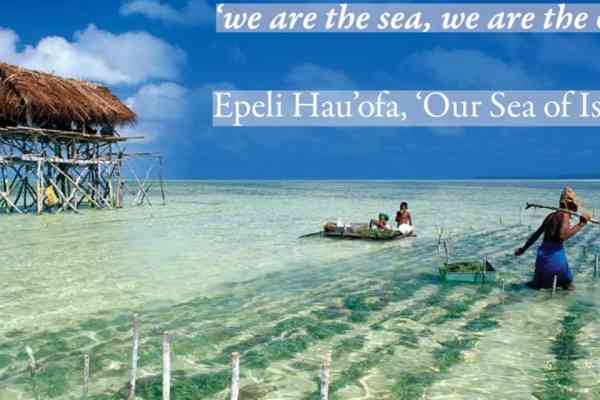Photo: Steve Hango and fellow ECOP Mildrek Kelokelo aboard the One Ocean Expedition in Fiji
(contenu disponible en anglais uniquement)
We know more about the moon than we know about our oceans - Early Career Oceans Professionals in Vanuatu
For a long time, the Vanuatu oceans office, charged with the management of Vanuatu’s marine environment and its resources, has been a one-man affair. Toney Trevi, Head of the Oceans Division under the Ministry of Foreign Affairs, has navigated the complex world where ocean resources, fisheries, climate change and environment collide.
“Vanuatu’s territory is made up of 98% ocean!, he says. “Sustainably managing 98% of your territory when it
’s ocean is not an easy thing. It’s 662,000 thousand square kilometres.”
For Toney, being at the forefront of managing Vanuatu’s vast ocean space is as much about changing hearts and minds as it is about ocean policy. He sees his role as being that of a peacemaker, broadening the perspectives of other policy makers, making connections and encouraging them to view the ocean as the vital environment that it is.
“Fisheries people don’t generally see ocean policy as priority because they've got fish on their minds. But as long as you can get one of them to appreciate what people in the environment area are doing, and what the people in the climate change area are doing, then they become interested and see the whole perspective of the ocean as a space rather than just a resource”, he says.
It’s against this backdrop that the Pacific Community Centre for Ocean Science (PCCOS) began its Early Career Oceans Professional Programme (ECOP) in 2021 with its first group of ECOP’s, as they are known, being placed in the Vanuatu oceans office under Toney’s charge.
The ocean covers more than 70% of the planet's surface, and amazingly more than 80% of our ocean is unmapped, unobserved, and unexplored.
PCCOS which was set up in 2017 and is hosted by the Pacific Community (SPC) in Noumea has, as one of its many reasons for being, the remit to be the centre in the Pacific that brings together and makes sense of the sometimes disparate and disconnected strands of ocean science to enable decision and policy makers to make informed decisions based on science that incorporates traditional knowledge systems.
Essentially PCCOS’ aim is to make connections. To bring people and ocean science and knowledge together to promote a greater understanding and appreciation of the ocean and its health. Which is precisely what Toney was doing at the Vanuatu Oceans Office where he now found himself with a bunch of new young colleagues to work with.
“One of the things that has helped in the past is I’ve drunk a lot of kava with my colleagues”, he says laughing. “But with the ECOPs coming on board, it’s made my job so much easier”.
Set up as part of the United Nations Decade of Ocean Science for Sustainable Development, the ECOP Programme’s central purpose is to give Early Career Ocean Professionals in the Pacific, “the opportunity to engage in regional ocean science initiatives, from design to evaluation, strengthening their capacities along the way”. What that means on the ground is giving young ocean science graduates access to professional networking and development opportunities. And for the ECOP’s that landed with Toney in the Vanuatu Oceans Office, that’s just what they got.
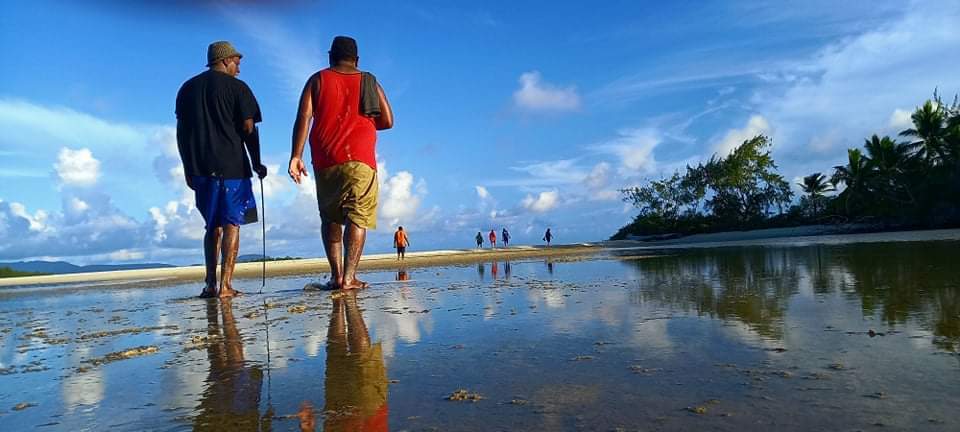
“It was a new experience for me”, says Steve William Hango who was one of this first group. “At uni we learned the theory but here we had hands on practicality, which was different, quite different from the theory aspect of things”, he says.
As an example, Steve, who studied Marine Science at the University of the South Pacific in Fiji and returned to Vanuatu after graduation tells a story about a trip he made to Wiawi on the Island of Malekula in Vanuatu.
“I've never seen anything like it. It was the first time for me to dive in the water and see schools of parrot fish, I think there were almost 200 of them, they were coming up to my mask and looking at me like they’d never seen a human being before. It’s something I’ll never forget. In this place the traditional governance was so strong, the way the chief managed that marine space was so strong that it was like it was untouched,” he says.
Parrot fish are called the underrated architects of the reef. They are vital for reef health. Take a look at this video to see the important role they play.
Traditional governance is at the core of ocean science in the Pacific. It’s an integral part of solutions to ocean health. Understanding how Pacific communities have successfully and sustainably managed their ocean for centuries is essential to understanding ocean health and enacting successful ocean management policies.
It’s something Toney feels strongly about. “When you want to talk about the sustainability of resources, you have to talk about traditional governance. These people in the community have a governance system that was designed ten thousand years ago. The biggest mistake you can make is to bring the science in and tell them that that the science will now sustain thing from now on. You have to realise that you will fly back to Port Vila and that they will still be there looking after the ocean like they have been for 10,000 years. We have to work together; the science is the added value to the traditional governance. When that happens, that’s when you’re working together”, he says.
IOM UNESCO explains on their website that Marine Spatial Planning (MSP) “is a public process of analyzing and allocating the spatial and temporal distribution of human activities in marine areas to achieve ecological, economic and social objectives that have been specified through a political process”.
At the time of writing, Toney’s office is carrying out a legal review that when legislated will enshrine in Vanuatu law a national marine spatial plan (MSP) that he describes as “out to the reef plus 100 meters becoming a traditional governance area”. This would hand over management of those areas to local communities in an attempt to marry traditional governance with ocean science to ensure the sustainable use of Vanuatu’s marines reserves.
“For me the reef plus 100 metre is the most important area because the biodiversity is very high and you need to give it back, make it sustainable and to do that, you cannot leave out the traditional governance system. By working together with traditional governance structures, the ocean scientists can come in and advise on what needs to be conserved in consultation with the local communities. Each will borrow the others knowledge”, says Toney.
As part of his ECOP programme, Steve has been heavily involved in the drafting of provincial Marine spatial plans, one of the first steps in getting a national MSP off the ground. Drafting and realising a MSP for his home provide of Torba is what he describes as his biggest achievement during the programme.
“We sat with the with provincial President, the Secretary General and we explained to them why we thought areas should be protected and they all agreed and agreed to our final MSP for the province, so it was quite a big feat for us, especially as young ECOPs”, Steve says.
And for Toney it was the cumulation of a bunch of proud moments, seeing his young colleagues using their ocean science educations to work with local communities to make a lasting contribution in protecting Vanuatu’s vast ocean space.
“You see them excited in learning, you see them coming back and writing reports, you see them in communities sharing knowledge and learning and explaining… they’ve been able to come in and gain hands on experience in a range of sectors and take the work I started and take it to another level”, he says before adding, “they know more than me now! I'm really happy that people like Steve can come in and be part of the decision making and also part of the awareness raising of how important the ocean is.”
For Steve the ECOP programme has been a springboard for his ocean science career. Thanks to support from PCCOS he was recently selected to participate in the One Ocean Expedition learning the basics of living and working on a ship, while deepening his understanding of the latest IPCC report and communicating on the ocean using the talanoa approach.
Asked what his advice to other young people considering a career in ocean science Steve says, “I would encourage them to come and join the oceans programme and learn more. We know more about the moon than we know about our oceans, so we need more assistance with our oceans”.
The Pacific ECOP programme is implemented by PCCOS and aims at supporting Pacific Island countries and territories in the implementation of their national ocean policies by hosting ECOP interns in their Ocean Office (or similar structures charged with the implementation of the national ocean policy). For more information on Pacific ECOPs or requests for ECOP interns, please reach out to Dr Katy Soapi, PCCOS Coordinator at [email protected].
